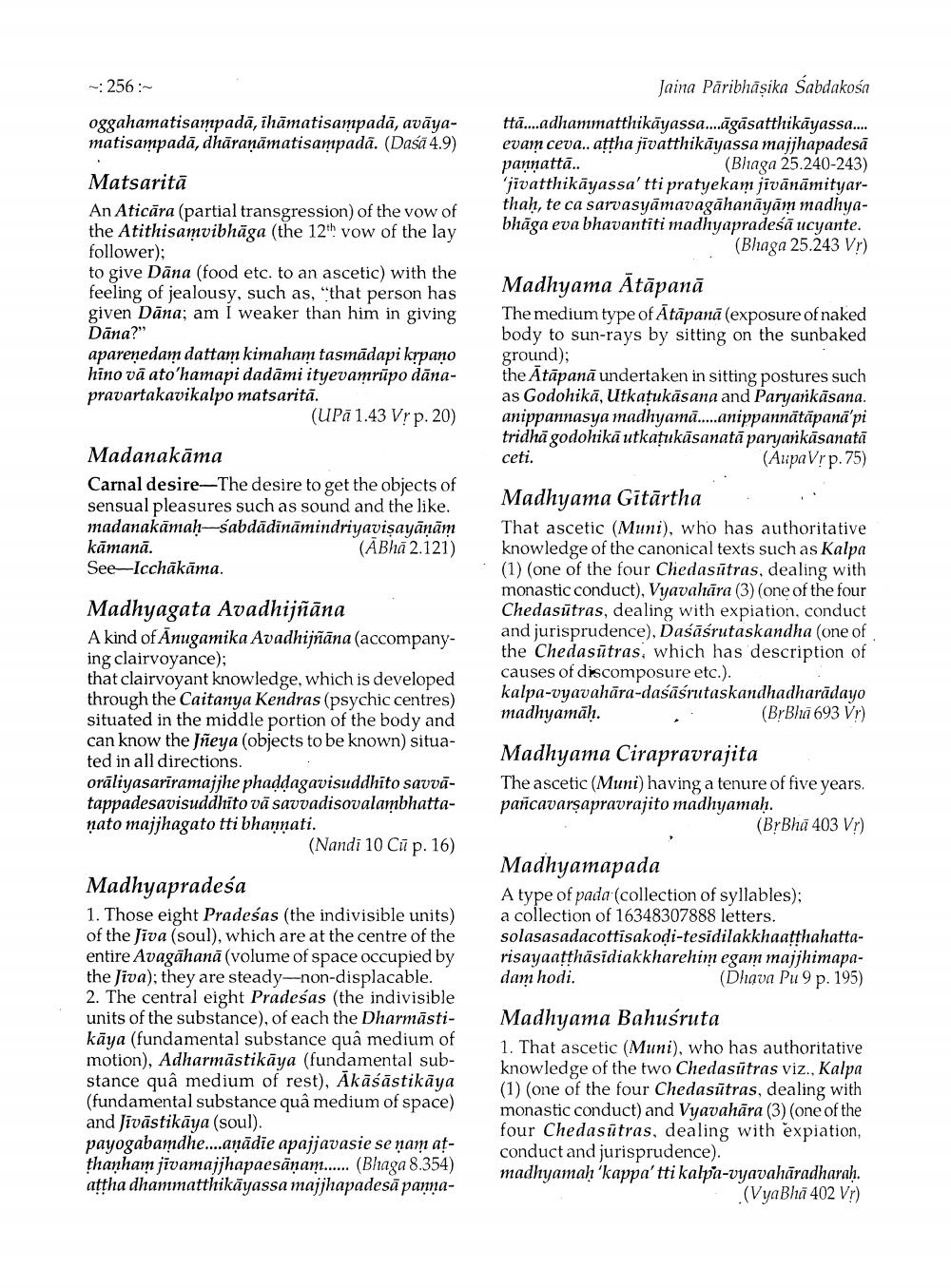________________
256 :
oggahamatisampadā, ihāmatisampadā, avāyamatisampadā, dhāraņāmatisampadā. (Dasa 4.9)
Jaina Pāribhāșika Sabdakosa ttä....adhammatthikāyassa....āgāsatthikāyassa.... evam ceva.. attha jīvatthikāyassa majjhapadesā pannattā..
(Bhaga 25.240-243) 'jivatthikāyassa'tti pratyekam jivānāmityarthah, te ca sarvasyāmavagāhanāyām madhyabhāga eva bhavantiti madhyapradeśā ucyante.
(Bhaga 25.243 Vr)
Matsaritā An Aticāra (partial transgression) of the vow of the Atithisamvibhāga (the 12th vow of the lay follower); to give Dāna (food etc. to an ascetic) with the feeling of jealousy, such as, that person has given Dāna; am I weaker than him in giving Dana?" aparenedam dattam kimaham tasmädapi krpano hino va ato'hamapi dadāmi ityevamrūpo dānapravartakavikalpo matsaritā.
(UPā 1.43 Vr p. 20)
Madhyama Ātāpanā
The medium type of Ātāpanā (exposure of naked body to sun-rays by sitting on the sunbaked ground); the Ātāpanā undertaken in sitting postures such as Godohikā, Utkațukāsana and Paryarikāsana. anippannasya madhyamā.....anippannätāpanā'pi tridhā godohikā utkatukāsanatā paryarikāsanatā ceti.
(AupaVrp.75)
Madanakāma Carnal desire--The desire to get the objects of sensual pleasures such as sound and the like. madanakāmah-sabdādināmindriyavişayāņām kāmanā.
(ABhā 2.121) See-Icchākāma.
Madhyama Gitārtha . . That ascetic (Muni), who has authoritative knowledge of the canonical texts such as Kalpa (1) (one of the four Chedasītras, dealing with monastic conduct), Vyavahāra (3) (one of the four Chedasūtras, dealing with expiation, conduct and jurisprudence), Daśāśrutaskandha (one of the Chedasūtras, which has description of causes of discomposure etc.). kalpa-vyavahāra-daśāśrutaskandhadharādayo madhyamāh.
(BrBhā 693 Vr)
Madhyagata Avadhijñāna A kind of Anugamika Avadhijñāna (accompanying clairvoyance); that clairvoyant knowledge, which is developed through the Caitanya Kendras (psychic centres) situated in the middle portion of the body and can know the Jñeya (objects to be known) situated in all directions. orāliyasariramajjhe phaddagavisuddhito savvatappadesavisuddhīto vā savvadisovalambhattanato majjhagato tti bhannati.
(Nandi 10 Cū p. 16)
Madhyama Cirapravrajita The ascetic (Muni) having a tenure of five years, pancavarşapravrajito madhyamah.
(BrBhā 403 Vr)
Madhyamapada A type of pada (collection of syllables); a collection of 16348307888 letters. solasasadacottisakodi-tesidilakkhaatthahattarisayaatthāsidiakkharehim egam majjhimapadam hodi.
(Dhava Pu 9 p. 195)
Madhyapradeśa 1. Those eight Pradeśas (the indivisible units) of the Jiva (soul), which are at the centre of the entire Avagāhanā (volume of space occupied by the Jiva); they are steady--non-displacable. 2. The central eight Pradeśas (the indivisible units of the substance), of each the Dharmāstikāya (fundamental substance quâ medium of motion), Adharmāstikāya (fundamental substance quâ medium of rest), Ākāśāstikāya (fundamental substance quâ medium of space) and Jivāstikāya (soul). payogabamdhe....aņādie apajjavasie se nam atthanham jivamajjhapaesāņam..... (Bhaga 8.354) attha dhammatthikāyassa majjhapadesā panna
Madhyama Bahuśruta 1. That ascetic (Muni), who has authoritative knowledge of the two Chedasūtras viz., Kalpa (1) (one of the four Chedasūtras, dealing with monastic conduct) and Vyavahāra (3) (one of the four Chedasūtras, dealing with expiation, conduct and jurisprudence). madhyamah'kappa' tti kalpa-vyavahāradharaḥ.
(VyaBhā 402 V)




